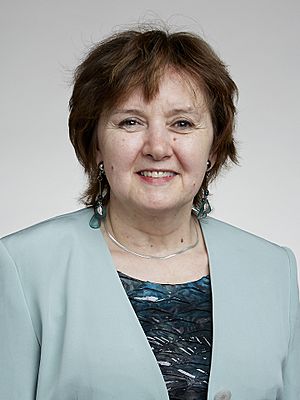Eugenia Kumacheva facts for kids
Quick facts for kids
Eugenia Kumacheva
|
|
|---|---|

Kumacheva in 2016
|
|
| Born |
Odesa, Ukrainian SSR, Soviet Union
|
| Nationality | Canadian |
| Alma mater | Saint Petersburg State Institute of Technology (BSc, MSc) Russian Academy of Sciences (PhD) |
| Awards | L'Oréal-UNESCO For Women in Science Award (2008) Canada Research Chair |
| Scientific career | |
| Fields | Chemistry Materials science Polymers Microfluidics Nanoscience |
| Institutions | University of Toronto Weizmann Institute of Science Moscow State University |
Eugenia Kumacheva is a very important professor of Chemistry at the University of Toronto in Canada. She is known for her amazing work in science, especially with tiny materials and liquids. Her research helps create new materials that can be used for many things, like delivering medicines to specific parts of the body or storing lots of information.
In 2008, she received a special award called the L'Oréal-UNESCO Awards for Women in Science for her discoveries. She has also written books and holds many patents for her inventions. Professor Kumacheva is a Fellow of the Royal Society and a Fellow of the Royal Society of Canada, which are big honors for scientists.
Contents
Early Life and Education
Eugenia Kumacheva was born in Odesa, which was part of the Soviet Union at the time. She loved learning and went to the Saint Petersburg State Institute of Technology to get her first university degrees.
After working in different industries for a few years, she decided to continue her studies. In 1986, she earned her PhD in physical chemistry. This means she became an expert in how chemicals behave, especially in materials called polymers.
Career and Discoveries
After finishing her PhD, Eugenia Kumacheva worked as a scientist at Moscow State University. Later, she moved to Israel to do more research at the Weizmann Institute of Science. She then came to Canada and joined the University of Toronto.
In 1996, she became a professor at the University of Toronto. By 2005, she was promoted to a Full Professor, which is a very high rank. She has published many scientific papers and holds 40 patents for her inventions. She even started two companies, FlowJEM and KuBE Materials Solutions!
What Does She Research?
Professor Kumacheva's work focuses on several exciting areas:
- Polymer science: This is the study of large molecules called polymers, which are found in plastics, rubber, and even our bodies.
- Nanoscience: This involves working with incredibly tiny materials, often smaller than a human hair.
- Microfluidics: This is about controlling tiny amounts of liquids, often through very small channels.
- Interface chemistry: This looks at what happens where different materials meet.
She is very interested in how her research can help in biology and medicine. For example, she has used her knowledge to understand conditions like heart attacks and strokes. She also explores how tiny bubbles or special gels can deliver medicines or help with imaging inside the body.
Recently, she has started using artificial intelligence (AI) to help create new materials. This shows how modern science combines different fields to make new discoveries. Her work also includes studying natural tiny particles, like those from plants.
Awards and Recognitions
Eugenia Kumacheva has received many important awards for her contributions to science. Some of these include:
- 1999: Premier Research Excellence Award (Canada)
- 2002: Canada Research Chair in Advanced Polymer Materials (Tier 2)
- 2007: Elected a Fellow of the Royal Society of Canada (FRSC)
- 2008: L'Oréal-UNESCO Women in Science Prize (for North America)
- 2010: Killam Research Fellowship
- 2012: Humboldt Research Award (Germany)
- 2013: University Professor (a special title at the University of Toronto)
- 2016: Elected a Fellow of the Royal Society (FRS) (the British National Academy of Science)
- 2017: Chemical Institute of Canada Medal (the top award in chemistry in Canada)
- 2019: De Gennes Prize from the Royal Society of Chemistry, U.K
- 2020: Appointed as an Officer of the Order of Canada (a very high honor in Canada)
- 2021: Guggenheim Fellowship
- 2023: Henry Marshall Tory Medal (Royal Society of Canada)
- 2023: ACS Award in Polymer Chemistry (USA)
These awards show how much her work is valued around the world.
See also
 In Spanish: Eugenia Kumacheva para niños
In Spanish: Eugenia Kumacheva para niños
 | George Robert Carruthers |
 | Patricia Bath |
 | Jan Ernst Matzeliger |
 | Alexander Miles |

